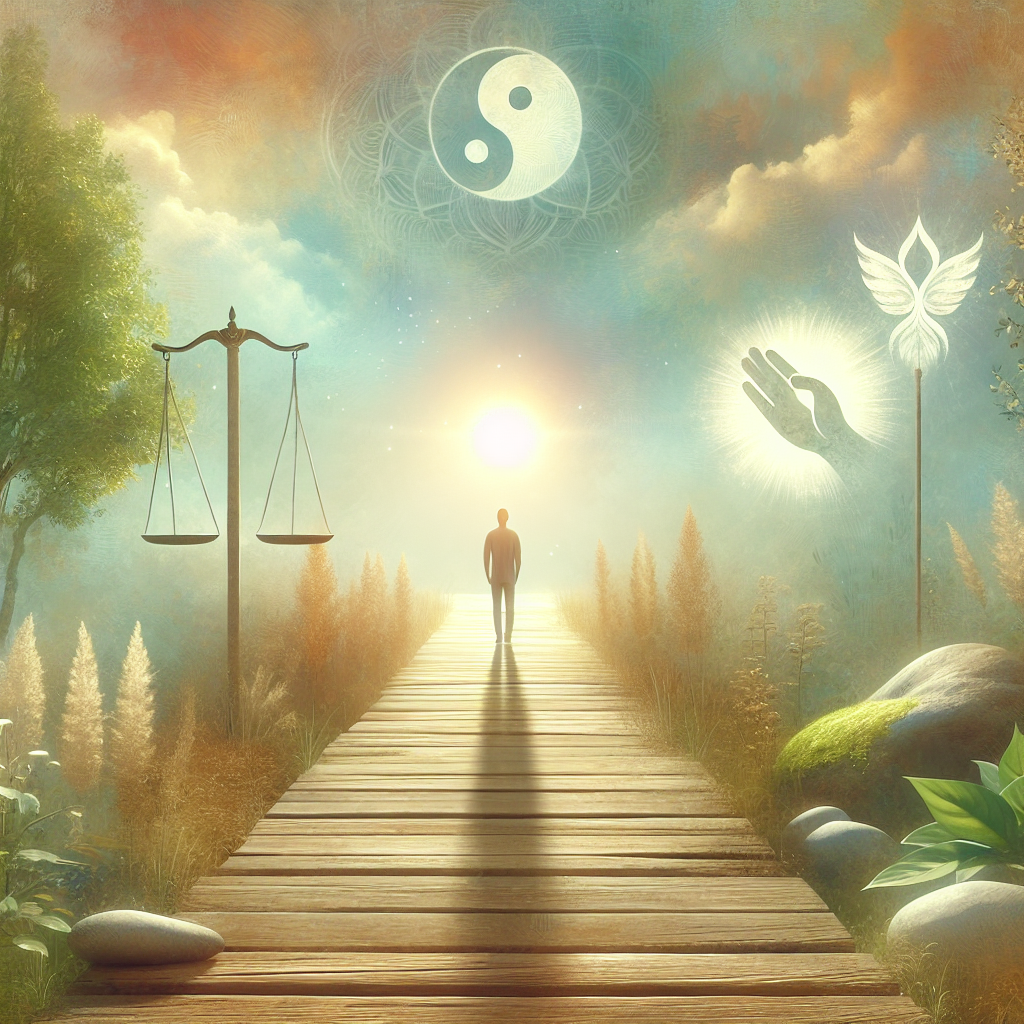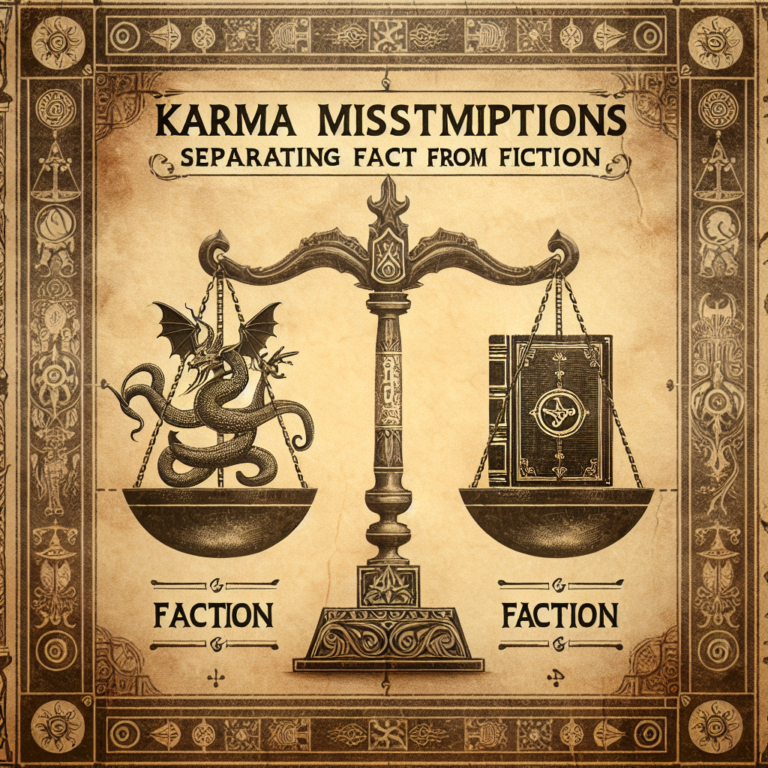Introduction
Karma, a term rooted in various spiritual and philosophical traditions, often evokes notions of cause and effect, particularly in the context of morality. It suggests that our actions—whether good or bad—have consequences that ripple through our lives and beyond, influencing our future experiences. Forgiveness, on the other hand, presents an emotional and psychological act of releasing feelings of resentment or vengeance towards someone who has wronged us. The interplay between these two concepts is vital for personal growth and healing. This article explores how karma and forgiveness can lead to a profound journey of healing and self-discovery.
Understanding Karma
Karma originates from the Sanskrit word “karman,” which means “action.” At its core, karma teaches that every action has an equal and opposite reaction. In many spiritual traditions, karma is not strictly a punitive concept; rather, it is an opportunity for growth. Positive actions can lead to beneficial outcomes, while negative actions may lead to suffering.
This understanding urges individuals to take responsibility for their actions, encouraging a mindful approach to life. Rather than viewing ourselves as victims of circumstances, we begin to see that we can actively shape our realities.
The Law of Attraction
Karma is closely linked to the popular belief in the Law of Attraction, which states that like attracts like. This principle echoes the teachings of karma by emphasizing that our thoughts, intentions, and actions create the life we experience. When we operate from a place of positivity and kindness, we attract similar energy back into our lives. Conversely, when we harbor negative thoughts and engage in harmful actions, we may inadvertently trap ourselves in a cycle of negativity.
The Role of Forgiveness
Forgiveness is often misconceived as an act of condoning or excusing someone’s behavior. In truth, it is much deeper; it is a conscious decision to let go of resentment and choose peace. When we harbor anger or grudges, we imprison ourselves in a cycle of pain that can impede our personal growth and happiness.
Forgiveness is not just about the other person; it is primarily for our well-being. It is a liberating act, allowing us to take back control of our feelings and lives. When we forgive, we release ourselves from the burdens of the past, paving the way for healing and renewal.
The Healing Power of Forgiveness
When we embrace forgiveness, we experience a range of therapeutic benefits. Studies show that forgiving others can lead to reduced anxiety, diminished hostility, and increased feelings of emotional well-being. It acts as a balm to our emotional wounds, allowing us to experience life more fully and openly.
Furthermore, forgiving those who have wronged us often goes hand in hand with self-forgiveness. This is an equally vital process. Many individuals grapple with guilt or shame related to their own actions. By forgiving ourselves, we can break the bonds of past mistakes and embrace our humanity, thereby facilitating healing.
The Intersection of Karma and Forgiveness
Spiritual Growth
Karma and forgiveness together offer a holistic pathway toward healing and self-discovery. The acknowledgement that our actions have consequences can serve as a profound teacher. When we understand how our past affects our present, we begin to recognize patterns in our lives, potentially directing us toward spiritual growth.
Forgiveness allows us to reflect on our relationships—not only with others but also with ourselves. It fosters introspection and self-awareness and encourages us to examine the emotions and motivations behind our actions. This self-discovery is essential in breaking free from negative behaviors and attitudes that may be rooted in a misunderstanding of our own karmic patterns.
Healing Through Empathy
The journey of understanding karma can also foster empathy. By realizing that others are enacting their own karmic journeys, we come to recognize that they may be acting out of hurt, fear, or ignorance. This perspective shift can help us approach interpersonal conflicts with compassion rather than anger.
Empathy fuels forgiveness and allows us to release judgment. When we forgive others, we acknowledge their humanity and suffering, thereby contributing to a collective healing process.
Practical Steps to Embrace Karma and Forgiveness
Self-Reflection: Begin by reflecting on your own actions and their consequences. Consider how your choices have shaped your experiences and relationships.
Mindfulness: Practice mindfulness to cultivate awareness of your thoughts and feelings. Recognize moments of anger or resentment without judgment, allowing yourself to process these emotions healthily.
Empathy: Make a conscious effort to understand the perspectives and experiences of others. This shift can often soften feelings of resentment and pave the way for forgiveness.
Write it Down: Journaling can be a powerful tool in the healing process. Write about your feelings of hurt and anger, then express your wish to forgive those who have wronged you.
Seek Support: Sometimes, seeking help from a therapist or joining a support group can provide needed guidance and encouragement to navigate your healing journey.
Affirmations: Use positive affirmations to reinforce your commitment to forgiveness. Daily reminders can help shift your mindset from one of bitterness to one of peace.
- Practice Self-Forgiveness: Don’t forget that self-forgiveness is crucial. Recognize your mistakes, learn from them, and grant yourself the compassion you would offer to a friend.
Conclusion
Karma and forgiveness are powerful concepts that can lead us toward healing and self-discovery. They remind us of the importance of taking responsibility for our actions while also liberating us from the burdens of past grievances. In embracing these principles, we embark on a journey filled with growth, empathy, and profound understanding, ultimately leading us toward a more fulfilled life.
FAQs
What is the difference between karma and fate?
Karma refers to the consequences of our actions and decisions, suggesting that we have the agency to shape our futures. Fate, on the other hand, implies a predetermined path that we cannot alter.
Can karma affect relationships?
Yes, karma can profoundly impact relationships as our actions towards others can create patterns that shape our interactions. Negative behavior may lead to strained connections, while kindness and understanding can cultivate stronger bonds.
Is forgiveness always required for healing?
While forgiveness is a valuable tool for healing, everyone’s journey is unique. Some may find healing without directly forgiving others, focusing instead on their own emotional well-being.
How can I practice self-forgiveness?
You can practice self-forgiveness by acknowledging your feelings, understanding your mistakes, and recognizing that everyone is human and makes errors. Journaling and positive self-affirmations can also be effective.
Do I need to reconcile with someone to forgive them?
No, reconciliation is not a requirement for forgiveness. Forgiving someone is an internal process and doesn’t necessitate re-establishing a relationship. It’s about freeing yourself from the emotional burden.
It seems like your message might have gotten cut off. Could you please provide more details or clarify what you’re looking for? I’m here to help!, #Karma #Forgiveness #Path #Healing #SelfDiscovery, #Karma #Forgiveness #Path #Healing #SelfDiscovery, 1736589693, karma-and-forgiveness-the-path-to-healing-and-self-discovery





